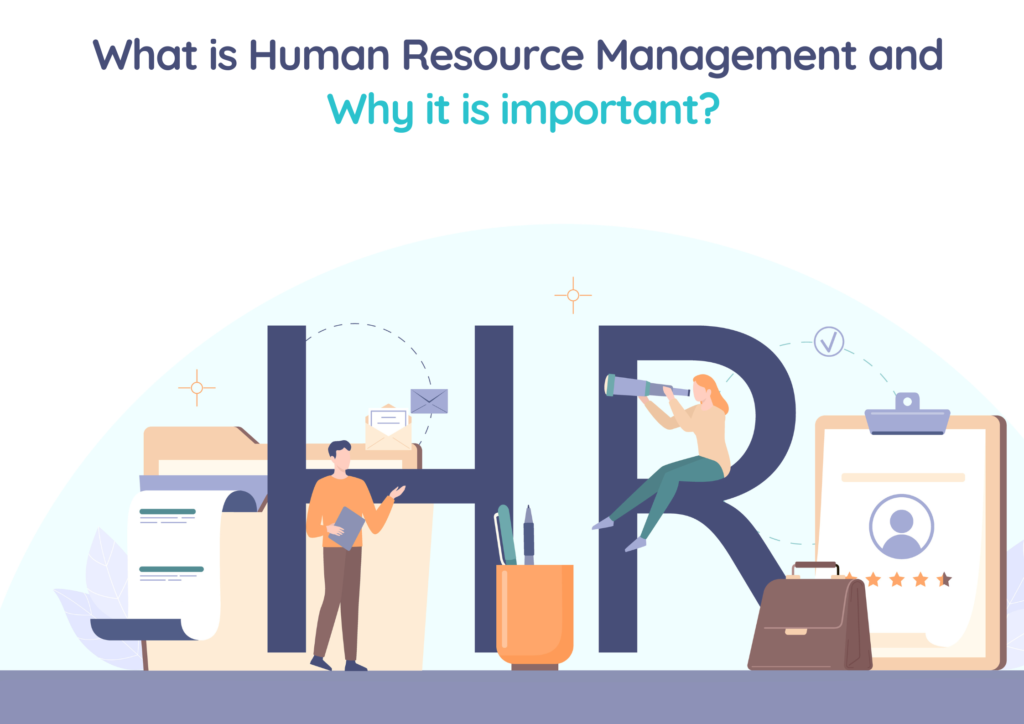What is Human Resource Management(HRM)?
Human resource management (HRM) encompasses the coordination, organization, and administration of employees within an organization to effectively accomplish its mission, vision, and goals. This involves various functions such as recruitment, selection, training, compensation, retention, and motivation of employees.
The HRM department, commonly referred to as human resources (HR), plays a crucial role in formulating, implementing, and overseeing policies that govern employees and manage the organization’s relationship with its workforce.
HRM entails the development of personnel policies and procedures that align with the organization’s strategic plans and support its overall business objectives. The core of HRM is the cultivation of a culture that embodies the organization’s core values and empowers employees to maximize their productivity.
Objectives of Human Resource Management:
Objectives of human resource management also play a significant role in an organization. HRM motivate employees to do work more communicative and effectively towards achieving their organization’s goal and objectives. Objectives of human resource management are categorized:
- Social Objective
- Functional Objective
- Organizational Objective
- Personal Objectives
Social Objective:
HRM comprises developing programs fulfilling employees’ economic, psychological, ethical, and social needs. For example, compensation and benefits programs, equal opportunity programs, community relations programs, disability employment programs, community relations programs etc. These programs aim to meet employees’ societal objectives, motivating and retaining productive employees. Measures put into place that responds to the ethical and social needs or challenges of the company and its employees. This includes legal issues such as equal opportunity and equal pay for equal work.
Functional Objectives:
The functional objective of HRM is to prepare organizational policies in compliance with provisional/ territorial related to human rights, occupational health and safety, employment equity, labour relations, and employment standards. This helps organizations maintain the quality of work life and ensure ethical employee behaviour.
Organizational Objectives:
This objective mainly focused on achieving their goals, earning a profit, and maximising growth. The organization’s HRM does planning for the hiring, training and placing of the employees. Applause the performance of the employees. Objectives of human resource management are a part to accomplish this objective.
Personal Objectives:
Personal objective as shown by its name enhances employee growth for the organisation. HRM also assist their employee with further training and achieving their goal. The personal objective should be maintained, retained and motivated by the employee. Objectives of human resource management are always required to fulfil the goal.
Read more:(Key Benefits of Outsourcing HR Services)
What are the functions of human resource management?
HR services can vary depending on the industry, the size of the business and the types of workers employed. In most cases, the primary objectives are to acquire, cultivate talent and improve communication and coordination among workforce members. Some of the key human resource management functions include:
Job analysis:
- Skill determination
- Determine appropriate compensation
- Create training programs
Workforce operations:
- Creating health and safety policies
- Employee grievances
- Assistance with Regulatory compliance
Performance measurement:
- Evaluating performance
- Constructive feedback
- Promotions and dismissals
Incentive programs:
- Recognizing achievements
- Rewarding high performers
- Business ownership objectives
Professional development:
- Orientation to advanced educational programs
- Employee training
- Reduces turnover and minimizes supervisory needs.
Hiring and Training New Employees:
An HR professional holding a management position often recruits, hires, and trains new employees. This means the HR team is responsible for finding candidates who meet the necessary qualifications for specified positions and fully vetting a company’s hires.
- Conducting interviews and reading resumes
- Performing background checks on applicants
- Overseeing or leading training procedures
- Implementing new training techniques
- Writing job descriptions, posting job listings, and recruiting potential candidates
- Creating a good impression on behalf of the company (HR is usually the first department candidates will meet)
Managing Company Risk:
The HR department works with organizational leadership to help manage risk and compliance. Human resource managers should be well-versed in business law, ethics, statistics, and problem-solving in order to help manage their company’s risk.
As an HR manager, you may be put in charge of the following risk management responsibilities:
- Analyzing statistical risk using company data
- Addressing and preventing potential lawsuits
- Supervising firing practices
- Properly training other managers
- Implementing diversity
- Protecting the organization’s data and upholding privacy for sensitive information
- Vetting new hires and improving hiring procedures
The bottom line – Human resource management is intended to protect the company and its employees. As a risk management specialist, you’ll help manage your company’s risk in a manner that involves statistical analysis, knowledge of business law, and overall improvement of company policies and practices.
Paying Employees and Negotiating Benefits:
One of HR’s primary roles is payment management and the organization’s staff benefits. Proper management of compensation, time off, and insurance is what keeps employee satisfaction high. As a human resource manager, you’ll be in charge of distributing, communicating, and improving compensation and benefits packages. Responsibilities within this department may include:
- Negotiating insurance packages with vendors
- Communicating benefits to new hires
- Keeping track of payroll
- Organizing employee paperwork (for payment and taxes)
- Managing vacation time, paid time off, and sick days
- Sorting out raises and bonuses for staff
Activities of HR:
Over the years, HR has evolved from a personnel department largely engaged with the administration to a strategic partner that works closely with management teams on organizational development.
Its seven key activities include
- Strategic planning
- Recruitment
- Training and development
- Payroll
- Policy creation
- Employee and labour relations
- Risk management
Read more:(Ways for Effective HR Management in Small Businesses)
Why choose TalentPro for your Human resource management needs?
TalentPro HR management solutions provide comprehensive automation and streamlined processes to assist HR professionals in dedicating more time to their people and reducing administrative burdens. Our packages are designed to meet basic requirements while also offering customization options to suit specific needs. Some of the key features we provide are as follows:
- Powerful Workforce Reporting: Our HR outsourcing services offer robust reporting capabilities that transform raw data into valuable insights for informed decision-making.
- Preconfigured New Hire Templates: We understand the importance of an efficient onboarding process. Our solution includes preconfigured templates that simplify and standardize the onboarding of new hires.
- Self-Service and Mobile Apps: To expedite time-sensitive HR tasks, our solution includes self-service features and mobile applications. This empowers employees and managers to access and complete necessary HR-related activities quickly and conveniently.
- Industry-Recognized Security: We prioritize the security and confidentiality of sensitive HR information. Our HR services incorporate industry-recognized security measures to safeguard data from unauthorized access, breaches, or data loss. By adhering to stringent security protocols, we provide peace of mind to our clients regarding the privacy and integrity of their HR data.
Wrap-up:
At TalentPro, we strive to enhance HR professionals’ productivity and elevate the employee experience through our automated and user-friendly HR management solutions.







